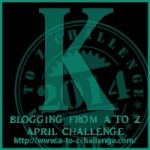“K” was a difficult day to find a writing-related word for. “Kenning” is just fun to say, so that’s what I went with.
A kenning is a very concentrated metaphor. It consists of a descriptive compound noun, with or without hyphen, used in place of a  common noun. The best examples come from Icelandic, Norse, and Anglo-Saxon epics, and from contemporary poetry.
common noun. The best examples come from Icelandic, Norse, and Anglo-Saxon epics, and from contemporary poetry.
Perhaps the most well-known kennings are the use of “Swan-road” and “Whale-road” as metaphors for the sea in Beowulf. This not only livens up the poetry; it tells us something about how the culture which produced that poem views the sea – it’s a means of travel, and an avenue of expansion and exploration. Not all cultures view the sea that way. For example, in Kautilya’s Arthashastra, an ancient Indian book on statecraft, the author clearly views the sea as a boundary rather than a medium of travel (I can’t find that text online to pull the quote, and do not own it; but that view of the ocean is present in the text).
I’m not willing to call the Beowulf kennings the ur-examples, though. You can also find them in modern translations if the Iliad (“horse-tamers” and “shield-breakers” spring immediately to mind; but I’m not up enough on how the Greek texts work to know whether Homer used kennings, or whether this is just an artifact of the English translations).
Here’s a definition from poetryarchive.org, with links to a few modern poems that use kennings.
Here are a pair of childrens’ poems by Andrew Fusek Peters (Dad) and Polly Peters (Mum) which are constructed entirely of kennings. The links include audio files of Andrew F. Peters reading both.
A to Z Badge by Jeremy of Being Retro

Thanks for that – I’ve learnt something new.
LikeLiked by 1 person
You’re welcome 🙂
LikeLike
This is brilliant, never heard of this word before and I really liked your examples! It also made me think: when did we start looking at the sea as a means of transport instead of considering it a barrier? That’s quite a big mentality change that still has an effect on our way of living I think. Thanks for this post!
Andrea, #atozchallenge Mighty Minion Asset
LikeLiked by 1 person
It varies from culture to culture.
I think it has to do, first of all, with scarcity of resources. Cultures without a lot of arable land, especially, tend to take to the sea. Political geography isn’t my specialty, so I’m sure I’m oversimplifying a bit.
LikeLiked by 1 person
You really do learn something new every day! Thanks Gene’O!
LikeLiked by 1 person
What a great word! I always love kennings when I find them in things. So nice to know they have their very own name.
LikeLiked by 1 person
I’d never known about this- thanks for the post. I’m doing the A to Z challenge as well- http://sukanyaramanujan.wordpress.com
LikeLiked by 1 person
In English Lit we had to read Beowulf and come back with a list of kennings we’d found. Good times.
I actually had a translation without very many of them, though. Go figure.
LikeLike
That’s very cool.
LikeLike
Pingback: Things I know now that I didn’t know on April 1: An A to Z Reflection | The Writing Catalog